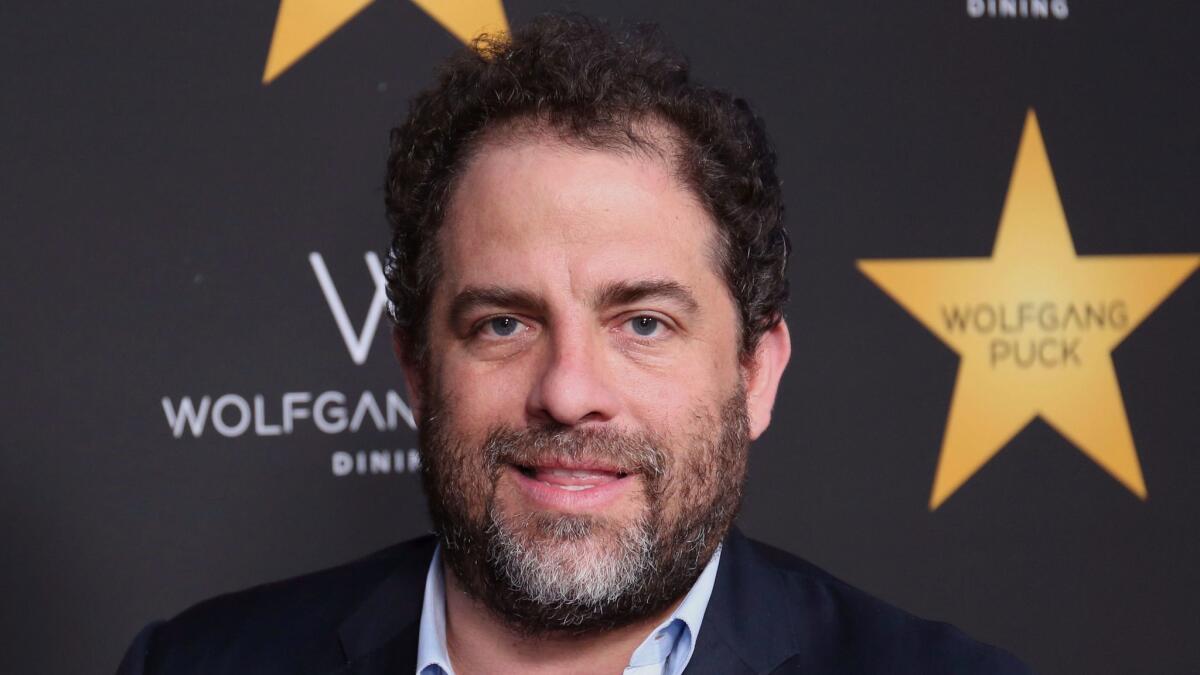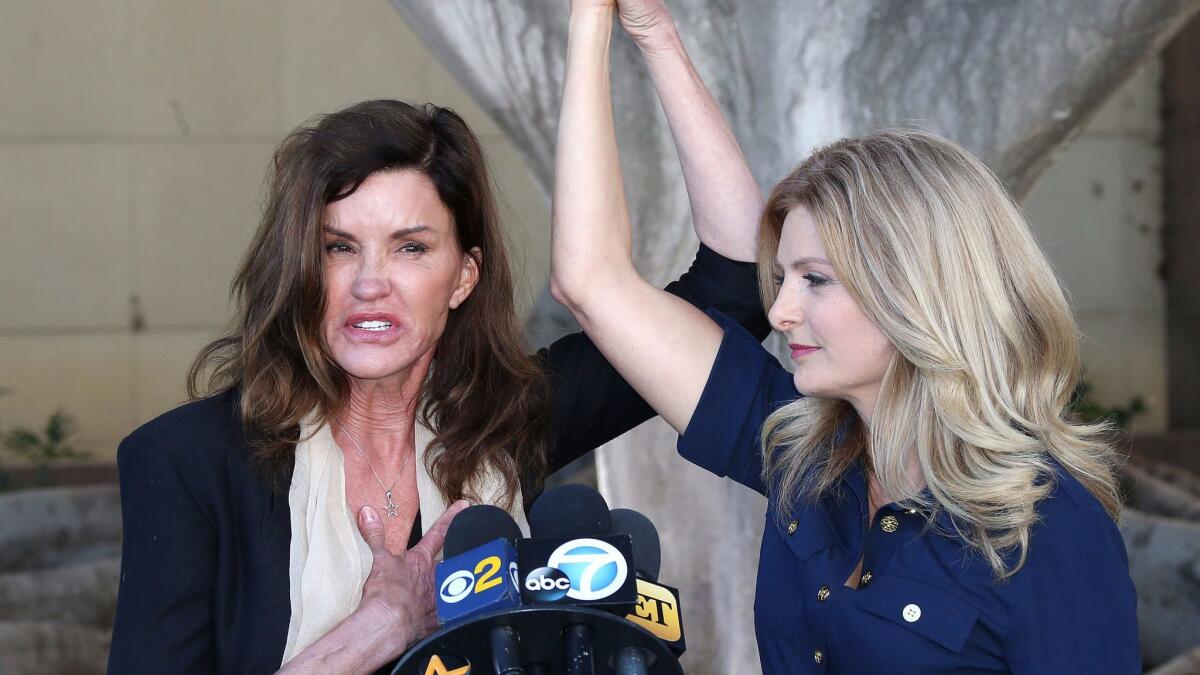Will Hollywood lawyer Martin Singer’s pitbull tactics still work in a post-Weinstein era?

In the hour before dusk, Marty Singer, the man celebrities call when a career is skidding toward scandal, stepped to a window on the 24th floor of his Century City law firm. A wisp of smog stretched from the ocean to the skyline, and Singer noted that the air was dirtier when he moved here from Brooklyn decades ago.
“The pollution was thicker back then,” he said. “But I don’t look out the window much.”
His deep, polished voice and demeanor, which on this day had the feel of a well-tailored accountant, belied his reputation as Hollywood’s favorite legal hit-man. His mission is to keep dirt out of the rarified air cushioning his A-list clients — a group that has comprised Bill Cosby, John Travolta, Scarlett Johansson, Arnold Schwarzenegger and currently includes producer-director Brett Ratner. Singer spends much of his time trying to kill unflattering stories, scrub unseemly headlines and prevent his celebrities from stepping into a courtroom.
His “cease and desist” and proceed “at your peril” letters to media outlets and accusers on behalf of clients are legendary. Recently, as The Times prepared stories in which more than ten women accused Ratner of sexual misconduct, the lawyer sent the paper multiple letters filled with florid language and threats of litigation. The missives, which would not have seemed out of place in the Hollywood novels of Michael Tolkin and Elmore Leonard, were the pummeling prose of a legal pugilist looking for an early knock-out.
“Marty’s like when (Mike) Tyson bit the ear off that guy,” said Sharon Stone at a tribute in 2012, when Singer was named Entertainment Lawyer of the Year by the Beverly Hills Bar Association. “That’s like Marty in law.” Similar testimonials flowed from Sylvester Stallone, Bruce Willis and Charlie Sheen; Singer had just won Sheen a reported settlement in excess of $100 million after Warner Bros. fired the troubled star from “Two and a Half Men.”
But as accusations against Ratner, Harvey Weinstein and a seemingly ever-widening cast of others increase, Singer’s hard-edged style is colliding with a sudden cultural shift toward empowering women (and men) to speak out about abuse. Strategies like Singer’s of pointedly challenging an alleged victim’s account, history and possible motivations are being questioned in an avenging time when men in entertainment, government, business, academia and the arts are being called out for sexual misconduct.
“Attacking the victim today doesn’t work like it used to,” said an entertainment lawyer who has argued cases against Singer and preferred to remain anonymous. “Everyone’s kind of onto this. You’ve got to be very careful about how you do that today. When you deal with celebrities, you’re on a dual path. First and foremost is the litigation but parallel is the public relations image part of it. There’s a lot of issues at stake.”

Singer has been criticized for his interactions with Melanie Kohler, who in October alleged in a Facebook post that Ratner had raped her about 12 years ago. Singer called Kohler, now a scuba shop owner in Hawaii, when the post went up. She says he frightened her into taking it down; he says she has changed her account multiple times and removed it after he calmly confronted her.
Soon after, a story appeared in the Los Angeles Times in which six women accused Ratner of sexual harassment (Kohler was not one of them) Ratner sued her for defamation. Kohler has since told her story publicly but Singer’s strategy is to chisel away at what he argues are inconsistencies that undercut an accusation’s veracity. For which he is unapologetic.
“I know people think I’m attacking victims. I’m this horrible person. I’m just trying to do a job,” said Singer. “Nobody screws my clients. If someone tries to go after them, I look out for them as if they’re my family.” Singer added he did not threaten Kohler. “I never raised my voice,” he said, a characterization supported by another attorney in his firm.
Kohler’s lawyer, Roberta Kaplan, sees it differently. “Harassing and intimidating would be a fair description of how my client and her husband, who was on the call, describe the way that he acted,” Kaplan said. “It was her justifiable fear of that intimidating and harassing conduct that resulted in her taking down the Facebook post. She absolutely believes that what she said (about Ratner) is true.”
Singer, 65, is accustomed to dealing with writers and editors, but the other day, dressed in a gray suit, blue shirt and tie, he invited a reporter into a conference room rather than his office. A heavy-set man with a meticulous haircut, Singer has inscrutable eyes and an underlying scrappiness of a character in a David Simon drama. He charges $1,050 an hour and has become — Stallone said Singer could write an encyclopedia on personalities — attuned to the darker side of human nature.
His combativeness “is as advertised,” said Brian Klein, a former federal prosecutor who now represents high-profile entrepreneurs and professionals. “It’s a lot of bark but that’s not to say there’s no bite. Rich clients want an aggressive response. They don’t want someone who’s milquetoast. He can get TMZ not to run something. That’s a five minute phone call but it can save an entire career.”
The world Singer and other longtime celebrity lawyers, including Bert Fields (who is defending Weinstein) and Skip Brittenham, navigate has changed dramatically. The atomized, insatiable and rapid-fire internet has reshaped a media landscape driven by blogs, Twitter, Facebook and websites like TMZ. Lawyers representing celebrities often have only hours to act against tawdry news, and those like Singer, who once could call an editor to negotiate over a story, now face hackers, texters, sexters and opportunists posting nude photos with little accountability.
“It’s coming much faster,” said Singer, adding that when it’s on the internet, “it’s there forever.”
In 2014, Singer threatened Google with a lawsuit for not acting quickly enough to remove stolen pictures that appeared online of “over a dozen female celebrities, actresses, models and athletes.” His letter to the Internet giant said sites that post such pictures “repeatedly exploit and victimize these women.” Singer at the time did not name his clients, but those who had photographs stolen included Jennifer Lawrence, Amber Heard, Avril Lavigne and Vanessa Hudgens. Google responded that it had swiftly taken down the pictures.

Some on the receiving end of the lawyer’s attacks have fired back as Singer himself is being sued for defamation. Model Janice Dickinson claims he publicly branded her a liar three years ago after she accused Bill Cosby of raping her in Lake Tahoe in 1982. Dickinson is also suing the comedian, whom Singer represented until Cosby hired another firm in 2015. Dickinson’s lawyer, Lisa Bloom, who briefly represented Weinstein as allegations mounted against him in October, would not discuss Singer’s tactics except to say he was “a skilled and fierce litigator.”
A California appeals court ruled last week that Singer’s letters to media organizations branding Dickinson a liar were not protected by litigation privilege. The court found that Singer’s strategy of threatening the media with lawsuits if they published Dickinson’s claims against Cosby were a “bluff intended to frighten the media outlets into silence.” The court said the letters amounted to “hollow threats of litigation” because Cosby never intended to sue the media organizations, and therefore the defamation suits against both Cosby and Singer could go forward.
“We disagree with the Court of Appeal’s decision permitting Mr. Singer to be named as a party,” according to a statement released by Singer’s lawyer, Jeremy B. Rosen. “Ultimately, we feel confident that Mr. Singer will prevail.”
Such is the terrain Singer navigates, a world of recrimination and high-priced attorneys, where celebrities are desperate to protect their images, fortunes are at stake, and truths and lies often mingle in hazy versions of reality.
“If there were issues involved, including currently, where I had a concern whether clients are being truthful, I’ve had clients take lie detector tests just for me,” he said. “They’ve passed. . . but you never know who’s being truthful or not. Look, I’ve been very fortunate. I ‘ve been married for a long time and I’ve got a lot of friends and you never know, I’ve had relatives and friends, you have no idea if they’ve lied to you.”
Singer said that celebrity damage control — including his defense of Ratner or convincing a tabloid not to run a story about Johnny Depp’s daughter, Lily-Rose — accounts for only about 10% of his business. But it is what brought him renown; his bio on his law firm’s webpage has links to stories with headlines like “Get Me Marty Singer” and “Guard Dog to the Stars.” (Canine allusions have become a kind of shorthand when Singer’s name comes up.)
His letters to protect clients are almost mythic in a town at once fascinated by and skittish of falls from grace.In his recent letters to the Times, Singer threatened a $100 million lawsuit and wrote that The Times “proceeds to publish this Story at its peril.” Reams of similar letters have been mailed to numerous media and other organizations over the decades, including one to stop an auction that was “falsely describing” Stallone’s boxing gloves from “Rocky” were for sale.
“Marty has protected my clients not from salacious crimes but from being exploited through the online theft of their images, from stalkers who threatened their safety, from libelous and slanderous attempts to ruins their careers and reputations,” said Kelly Bush Novak, a publicist who has represented Warren Beatty, Diane Lane and Tobey Maguire.
Singer has an array of tactics. Comedian and actor Tom Arnold, a man accustomed to lawsuits and a long-time Singer client, has a favorite story about the lawyer that happened around 1990 when Arnold was deposed in a case involving the ex-husband of his then-new wife Roseanne Barr. Arnold was being questioned by Marvin Mitchelson, a celebrity attorney who pioneered the right of palimony.
“Mitchelson was trying to incite me to prove I was a crazy person,” said Arnold. “While he was saying all this stuff to inflame me, I was giving him the double fingers. And Marty wouldn’t look at me. He would not look at me the whole time. And Mitchelson says, ‘I want the record to show that Mr. Arnold is giving the bird.’ And Marty said, ‘That is an absolute lie.’ He wasn’t looking at me, so in his mind it wasn’t a lie.”
Singer was born in Brooklyn, the son of immigrants. His mother survived Auschwitz and his father ran a silk screen printing company. He graduated from Brooklyn Law School and wanted to be a tax lawyer. But after teaming up with John H. Lavely Jr. to form Lavely & Singer in 1980, he gravitated to the trials and tribulations of the wealthy: real estate deals, architectural disputes and battles over contracts and gross percentages of movies, including a Jean-Claude Van Damme suit with testimony about a safe filled with documents flying out of a house during an earthquake.
Singer’s heard a lot of such unexpected stories; sometimes in the middle of the night.
“Anybody remember the term Eddie Murphy is a ‘Good Samaritan’?” Singer told law students at his alma mater in 2012. “That’s a term I came up with at six o’clock in the morning (in 1997) when I got a phone call — sometimes I have to act as a publicist — . . .[when] Eddie Murphy picked up a transvestite in Hollywood. Everybody was panicking.” Murphy was not arrested or charged and his account was that he was offering the person, a prostitute, a ride home.
When asked if he ever thought of specializing in criminal law, Singer paused. “My brother-in-law was murdered,” he said. “I just never thought about becoming a criminal lawyer. . . I didn’t feel it was appropriate to get someone out on a technicality, which is how many criminal cases end.”
The sexual abuse and harassment allegations that have shaken Hollywood and the country are challenging the power equations that have existed for generations between men and women. The entertainment industry — where Singer is a master — is becoming vigilant and less tolerant of sexual infractions. Singer said such awareness is good, but worries that troubling questions over legal rights may arise if the atmosphere is too charged.
“I think (things) are changing. You read about it every day,” he said. “One accusation and a person is fired off a show. Some people say it’s a witch hunt. I’m not saying it, but some people say it is right now. There’s a power now that exists.” He added: “In terms of the industry, it’s having a significant impact. . .I think it’s dangerous. The American system is you’re innocent until proven guilty.”
Twitter: @JeffreyLAT
More to Read
The biggest entertainment stories
Get our big stories about Hollywood, film, television, music, arts, culture and more right in your inbox as soon as they publish.
You may occasionally receive promotional content from the Los Angeles Times.











